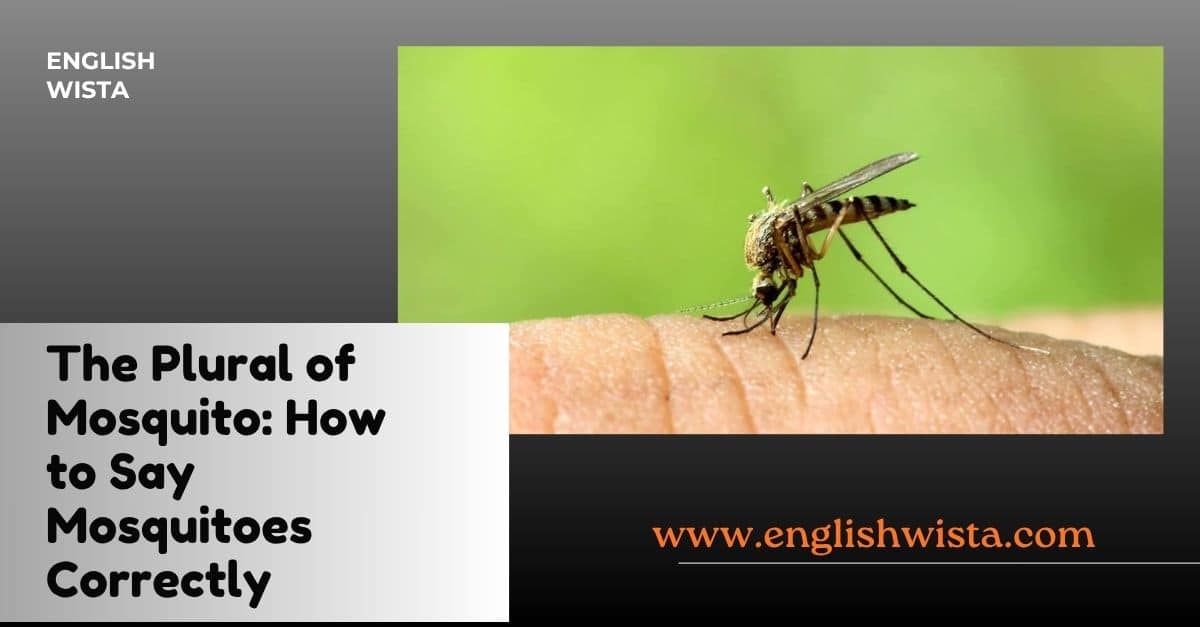Have you ever been outside on a warm summer night, trying to enjoy the fresh air, only to be bothered by a tiny buzzing creature? Yes, we’re talking about the mosquito. These little insects are famous for their itchy bites, and they often come in groups. But wait when there’s more than one mosquito, what do we call them? Is it mosquitos or mosquitoes?
This is a common question, and many people even native English speakers get a little confused about it. Don’t worry, though. In this article, we’ll break it down step by step. By the end, you’ll know exactly how to use the plural of mosquito with confidence. Let’s dive in!
What Does the Word “Mosquito” Mean?
Before we get into the plural, let’s make sure we know the word itself.
A mosquito is a small flying insect with long legs and a thin body. The females are known for biting humans and animals to feed on blood. While they are annoying, they’re also an important part of nature.
So, one mosquito equals a single insect. But what happens when there are many? That’s where the plural form comes in.
What Is the Plural of Mosquito?
Here’s the clear and simple answer:
The plural of mosquito can be spelled in two ways:
- mosquitoes
- mosquitos
Yes, both are correct! English can sometimes give us options, and this is one of those cases.
Which Spelling Is More Common?
While both versions are correct, one is used more often.
- Mosquitoes (with “-es”) is the more common spelling, especially in American English.
- Mosquitos (without the “e”) is also correct but is less common and often seen in British or informal usage.
So, if you’re writing for school, work, or anything formal, it’s safest to use mosquitoes. If you use mosquitos, people will still understand you, but it may look unusual to some readers.
Why Are There Two Plural Forms?
Great question! The reason comes from how English borrows words from other languages.
The word mosquito comes from Spanish and Portuguese. In Spanish, “mosquito” means “little fly” (from mosca = fly + -ito = little). When English adopted the word, it followed typical rules for plurals.
- Many words ending in “o” add “-es” in the plural:
- tomato → tomatoes
- hero → heroes
- mosquito → mosquitoes
But English is not always consistent. Some “o” words just add “-s”:
- piano → pianos
- photo → photos
- mosquito → mosquitos (an accepted variation)
So both spellings stayed in use.
Examples in Sentences
Let’s look at some sentences to see how both plural forms are used in real life.
- Last night, I was bitten by five mosquitoes in the garden.
- There are too many mosquitos near the lake during summer.
- We set up mosquito nets to keep the mosquitoes out of the tent.
- Some people say mosquitos while others prefer mosquitoes, but both are fine.
As you can see, the meaning doesn’t change. The choice is just about spelling preference.
Is “Mosquito” Singular or Plural?
Sometimes learners get confused: is mosquito already plural? The answer is no.
- Mosquito = one insect (singular).
- Mosquitoes / Mosquitos = more than one insect (plural).
Simple and clear!
How Do You Remember the Correct Plural?
If you want an easy trick, remember this:
Most of the time, when a word ends in o after a consonant, we add -es.
- potato → potatoes
- hero → heroes
- mosquito → mosquitoes
This rule will help you most of the time. Just keep in mind that some words are exceptions.
Other Words Similar to Mosquito
Let’s look at a few more words that behave like mosquito when they become plural:
- tomato → tomatoes
- echo → echoes
- torpedo → torpedoes
But remember, not all words ending in “o” follow this pattern. Some just take “-s”:
- photo → photos
- radio → radios
- piano → pianos
English loves to keep us on our toes!
Fun Fact: Collective Nouns for Mosquitoes
Here’s something interesting: when talking about a group of mosquitoes, English sometimes uses special phrases called collective nouns.
- A swarm of mosquitoes
- A cloud of mosquitoes
- A scourge of mosquitoes
Imagine being surrounded by a whole swarm of mosquitoes not fun at all!
The Word Origin of Mosquito
As mentioned earlier, “mosquito” comes from Spanish and Portuguese. The root word is mosca, meaning “fly.” The ending -ito makes it a diminutive, meaning “little.” So literally, mosquito means “little fly.”
This makes sense, doesn’t it? A mosquito does look like a tiny fly.
Common Mistakes to Avoid
When writing or speaking, some people make mistakes with the plural form of mosquito. Let’s clear those up:
- Don’t write “mosquities.” That’s incorrect.
- Don’t write “mosquotoes.” That’s also incorrect.
- The correct choices are always mosquitoes or mosquitos.
Comparing Mosquito with Similar Words
Sometimes it helps to compare mosquito with other tricky plurals.
- Potato → Potatoes (same pattern as mosquito)
- Volcano → Volcanoes / Volcanos (two correct forms, just like mosquito)
- Buffalo → Buffalo / Buffalos (again, both accepted)
So mosquito is not alone. English allows some flexibility in these cases.
Real-Life Practice: Can You Guess the Right Word?
Let’s try a little practice. Fill in the blanks with the correct plural of mosquito.
- The campers were surrounded by hundreds of ___________.
- A few ___________ got inside the bedroom last night.
- The scientist studied the behavior of ___________ in the rainforest.
Correct answers: mosquitoes (or mosquitos) for all three!
Fun Facts About Mosquitoes
To keep things interesting, let’s throw in a few fun facts about mosquitoes:
- There are over 3,000 species of mosquitoes worldwide.
- Only female mosquitoes bite, because they need blood to produce eggs.
- Mosquitoes are found on every continent except Antarctica.
- They are considered one of the deadliest animals because they spread diseases like malaria, dengue, and Zika.
So the plural isn’t just useful for grammar it’s handy in science, too!
Quick Recap
Let’s summarize what we’ve learned so far:
- The word mosquito means a small flying insect known for biting.
- The plural can be mosquitoes or mosquitos.
- Mosquitoes is the more common spelling.
- Both forms are correct and accepted.
- Collective nouns include swarm of mosquitoes and cloud of mosquitoes.
Conclusion
So, what’s the plural of mosquito? Easy it can be either mosquitoes or mosquitos. Most people use mosquitoes, but both spellings are right. Now, the next time you’re talking about those buzzing little insects, you’ll know exactly how to say it.
Language can sometimes feel tricky, but remember, the main goal is communication. As long as people understand what you mean, you’re doing great. Still, using the more common mosquitoes will keep your writing clear and standard.
The next time you’re out on a summer evening and swatting at a whole swarm, you’ll have more than one reason to think about mosquitoes not just because of their bites, but because you now know how to talk about them correctly!



